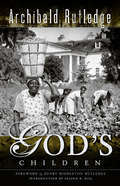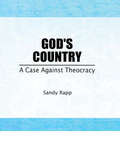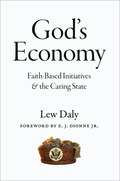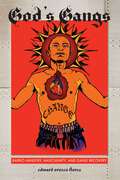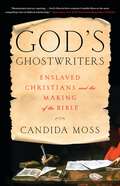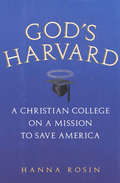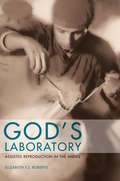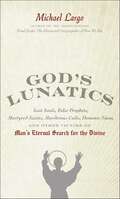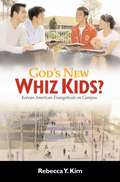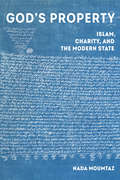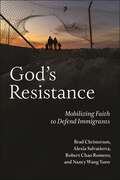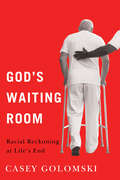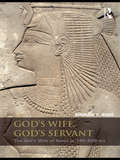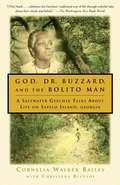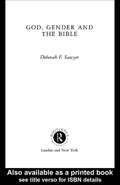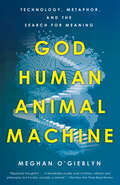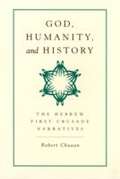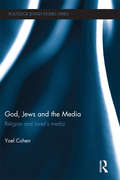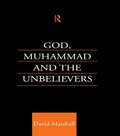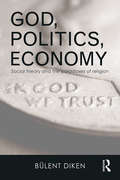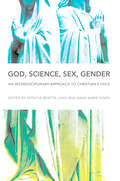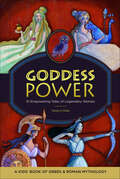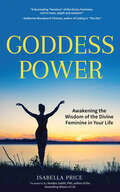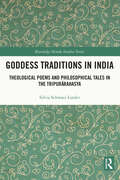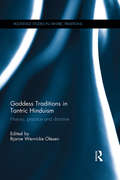- Table View
- List View
God's Children (American Heritage Ser.)
by Archibald RutledgeThis 1940s memoir provides a glimpse into the life and thoughts of a South Carolina plantation owner in the post-Civil War, pre-Civil Rights era.In 1937, after decades in the North, Archibald Rutledge returned to what he described as the “hyacinth days and camellia nights” of his native Carolina Lowcountry to restore his ancestral home, Hampton Plantation, which had been in his family since 1730. Originally published in 1947, these pages describe, in intimate and fascinating detail, the plantation life he found upon his return. In the simple, lyrical language of the first poet laureate of South Carolina, Rutledge portrays the black men and women, descendants of slaves, who labored alongside him in the marshes of the Santee, the stories they shared, and his interactions with them. God’s Children serves as a vivid snapshot of day-to-day activity on a plantation in the American South in the first half of the twentieth century, and of a lifestyle that was ever so slowly disappearing.
God's Country: A Case Against Theocracy
by Sandy RappExplore the influence of religion on the privacy rights of U. S. citizens in this controversial new book!Here is a compelling and controversial new book that explores the enormous political influence that some religious groups currently wield. God’s Country focuses particularly on the issue of personal privacy rights and the strategies and rhetoric these religious groups are using to diminish those rights among select segments of society. Author Sandy Rapp, a grassroots activist, shares her experiences in one-on-one debates with religious fundamentalists who have been on opposite sides of the social issues for which she has so passionately fought in recent years. Topics in this fascinating book include: privacy rights individual’s rights as stated in the constitution AIDS and homophobia the abortion choice global population crisis gay and lesbian reporductive rights effective strategies for lobbyingSandy Rapp traces the patriarchal premises which underlie the twentieth-century crusade against homosexuality. She integrates various personal and professional perspectives and provides a challenging and comprehensive examination of the physical and psychological devastation inflicted upon women, lesbians, and gay men due to religious and political control over such personal decisions as the expression of one’s sexuality, the use of birth control, the choice of abortion, and privacy rights. God’s Country poses some provocative questions that are certain to spark debate among enlightened religious professionals, professors, and students of political science, government, women’s history, human sexuality, and religion: Does the government have the right to impose mandatory childbirth upon women? Should a gay or lesbian person’s sexual orientation weaken his/her civil rights? Can, in a free society, the religious beliefs of one denomination or group be imposed on all citizens? If freedom for all is to upheld in the United States, shouldn’t the separation of church and state be maintained?
God's Economy: Faith-based Initiatives and the Caring State
by Lew DalyPresident Obama has signaled a sharp break from many Bush Administration policies, but he remains committed to federal support for religious social service providers. Like George W. Bush's faith-based initiative, though, Obama's version of the policy has generated loud criticism--from both sides of the aisle--even as the communities that stand to benefit suffer through an ailing economy. God's Economy reveals that virtually all of the critics, as well as many supporters, have long misunderstood both the true implications of faith-based partnerships and their unique potential for advancing social justice. Unearthing the intellectual history of the faith-based initiative, Lew Daly locates its roots in the pluralist tradition of Europe's Christian democracies, in which the state shares sovereignty with social institutions. He argues that Catholic and Dutch Calvinist ideas played a crucial role in the evolution of this tradition, as churches across nineteenth-century Europe developed philosophical and legal defenses to protect their education and social programs against ascendant governments. Tracing the influence of this heritage on the past three decades of American social policy and church-state law, Daly finally untangles the radical beginnings of the faith-based initiative. In the process, he frees it from the narrow culture-war framework that has limited debate on the subject since Bush opened the White House Office for Faith-Based and Community Initiatives in 2001. A major contribution from an important new voice at the intersection of religion and politics, God's Economy points the way toward policy-making that combines strong social support with a new moral focus on the protection of families and communities.
God's Gangs: Barrio Ministry, Masculinity, and Gang Recovery
by Edward Orozco FloresWinner, 2014 Distinguished Contribution to Research Award presented by the Latina/o Sociology Section of the American Sociological AssociationLos Angeles is the epicenter of the American gang problem. Rituals and customs from Los Angeles’ eastside gangs, including hand signals, graffiti, and clothing styles, have spread to small towns and big cities alike. Many see the problem with gangs as related to urban marginality—for a Latino immigrant population struggling with poverty and social integration, gangs offer a close-knit community. Yet, as Edward Orozco Flores argues in God’s Gangs, gang members can be successfully redirected out of gangs through efforts that change the context in which they find themselves, as well as their notions of what it means to be a man. Flores here illuminates how Latino men recover from gang life through involvement in urban, faith-based organizations. Drawing on participant observation and interviews with Homeboy Industries, a Jesuit-founded non-profit that is one of the largest gang intervention programs in the country, and with Victory Outreach, a Pentecostal ministry with over 600 chapters, Flores demonstrates that organizations such as these facilitate recovery from gang life by enabling gang members to reinvent themselves as family men and as members of their community. The book offers a window into the process of redefining masculinity. As Flores convincingly shows, gang members are not trapped in a cycle of poverty and marginality. With the help of urban ministries, such men construct a reformed barrio masculinity to distance themselves from gang life.
God's Ghostwriters: Enslaved Christians and the Making of the Bible
by Candida MossFrom an award-winning biblical scholar, the &“monumental and eye-opening&” story of how enslaved people created, gave meaning to, and spread the message of the New Testament, shaping the very foundations of Christianity in ways both subtle and profound (Reza Aslan). For the past two thousand years, Christian tradition, scholarship, and pop culture have credited the authorship of the New Testament to a select group of men: Matthew, Mark, Luke, John, and Paul. But hidden behind these named and sainted individuals are a cluster of unnamed, enslaved coauthors and collaborators. These essential workers were responsible for producing the earliest manuscripts of the New Testament: making the parchment on which the texts were written, taking dictation, and refining the words of the apostles. And as the Christian message grew in influence, it was enslaved missionaries who undertook the arduous journey across the Mediterranean and along dusty roads to move Christianity to Rome, Spain, and North Africa—and into the pages of history. The impact of these enslaved contributors on the spread of Christianity, the development of foundational Christian concepts, and the making of the Bible was enormous, yet their role has been almost entirely overlooked until now. Filled with profound revelations both for what it means to be a Christian and for how we read individual texts themselves, God&’s Ghostwriters is a groundbreaking and rigorously researched book about how enslaved people shaped the Bible, and with it all of Christianity.
God's Harvard: A Christian College on a Mission to Save America
by Hanna RosinSince 2000, America’s most ambitious young evangelicals have been making their way to Patrick Henry College, a small Christian school just outside the nation’s capital. Most of them are homeschoolers whose idealism and discipline put the average American teenager to shame. And God’s Harvard grooms these students to be the elite of tomorrow, dispatching them to the front lines of politics, entertainment, and science, to wage the battle to take back a godless nation. Hanna Rosin spent a year and a half embedded at the college, following the students from the campus to the White House, Congress, conservative think tanks, Hollywood, and other centers of influence. Her account captures this nerve center of the evangelical movement at a moment of maximum influence and also of crisis, as it struggles to avoid the temptations of modern life and still remake the world in its own image.
God's Laboratory
by Elizabeth F. RobertsAssisted reproduction, with its test tubes, injections, and gamete donors, often raises important concerns regarding matters of life and kinship. Yet these concerns do not take the same form everywhere around the world. In this innovative ethnography of in vitro fertilization in Ecuador, Elizabeth Roberts shows how having children through biotechnological intervention is not only tolerated, it is embraced by the population, despite widespread poverty and official condemnation by the Catholic Church. Roberts takes us into clinics, laboratories, and homes, providing a textured picture of the integration of these biotechnologies into Andean life. Intimate portraits of patients, donors, and practitioners reveal profoundly different understandings of nature and the self compared with those found in other countries. Andean understanding of the body as malleable resonates with cutting-edge theories of the material world put forth by contemporary scholars of science and technology. The Ecuadorian embrace of reproductive technology, however, is less a reflection of a desire to be "modern", than it is a product of colonial racial history, Catholic theologies, and kinship systems. This clearly written account offers a grounded introduction to debates in science studies and medical anthropology, as well as nuanced ethnography of the mingling of science, religion, and history in Andean family life.
God's Lunatics: Lost Souls, False Prophets, Martyred Saints, Murderous Cults, Demonic Nuns, and Other Victims of Man's Eternal Search for the Divine
by Michael LargoGod’s Lunatics is an eyebrow-raising encyclopedia of the strange and shocking side of history’s religions, cults, and spiritual movements, by Michael Largo, the bestselling author of the Bram Stoker Award-winning Final Exits. A fascinating compendium of “Lost Souls, False Prophets, Martyred Saints, Murderous Cults, Demonic Nuns, and Other Victims of Man’s Eternal Search for the Divine,” God’s Lunatics contains a wealth of valuable extreme spiritual information—including the number of exorcisms performed each year and the proper method for identifying the Antichrist.
God's New Whiz Kids?: Korean American Evangelicals on Campus
by Rebecca Y. KimIn the past twenty years, many traditionally white campus religious groups have become Asian American. Today there are more than fifty evangelical Christian groups at UC Berkeley and UCLA alone, and 80% of their members are Asian American. At Harvard, Asian Americans constitute 70% of the Harvard Radcliffe Christian Fellowship, while at Yale, Campus Crusade for Christ is now 90% Asian. Stanford's Intervarsity Christian Fellowship has become almost entirely Asian.There has been little research, or even acknowledgment, of this striking development.God’s New Whiz Kids? focuses on second-generation Korean Americans, who make up the majority of Asian American evangelicals, and explores the factors that lead college-bound Korean American evangelicals—from integrated, mixed race neighborhoods—to create racially segregated religious communities on campus. Kim illuminates an emergent “made in the U.S.A.” ethnicity to help explain this trend, and to shed light on a group that may be changing the face of American evangelicalism.
God's Property: Islam, Charity, and the Modern State (Islamic Humanities #3)
by Nada MoumtazA free open access ebook is available upon publication. Learn more at www.luminosoa.org.Up to the twentieth century, Islamic charitable endowments provided the material foundation of the Muslim world. In Lebanon, with the fall of the Ottoman Empire and the imposition of French colonial rule, many of these endowments reverted to private property circulating in the marketplace. In contemporary Beirut, however, charitable endowments have resurfaced as mosques, Islamic centers, and nonprofit organizations. A historical anthropology in dialogue with Islamic law, God's Property demonstrates how these endowments have been drawn into secular logics—no longer the property of God but of the Muslim community—and shaped by the modern state and modern understandings of charity and property. Although these transformations have produced new kinds of loyalties and new ways of being in society, Moumtaz’s ethnography reveals the furtive persistence of endowment practices that perpetuate older ways of thinking of one’s self and one’s responsibilities toward family and state.
God's Resistance: Mobilizing Faith to Defend Immigrants
by Brad Christerson Alexia Salvatierra Robert Chao Romero Nancy Wang YuenExplores the power of faith to drive resistance to anti-immigration policies in the United StatesGod’s Resistance chronicles the work of faith-based activists who have mobilized to counter the effectsof mass detention and deportation. Focusing on Southern California, home to a large undocumentedpopulation, the authors examine which strategies have been most effective, as well as the obstacles that faith presents to organizing effectively. In-depth interviews with over forty activists, leaders ofcongregations, lay participants, and immigrants allow us to hear at first hand the challenges andoccasional triumphs of this work.The authors show how faith-based organizations have a distinctive set of advantages to leverage insocial movements that are often overlooked and underappreciated by secular activist organizations, but they also face particular challenges that can hinder their effectiveness. The volume offers insights into how these advantages can be maximized, and how the obstacles can be overcome. The powerfultestimony from asylum seekers and detained immigrants found in these pages, along with the concreteexamples of effective strategies, are indispensable for anyone invested in the fight to recognize thehumanity of one of the nation’s most vulnerable populations.
God's Waiting Room: Racial Reckoning at Life's End (Global Perspectives on Aging)
by Casey GolomskiCan older racists change their tune, or will they haunt us further once they're gone? Rich in mystery and life's lessons, God's Waiting Room considers what matters in the end for older white adults and the younger Black nurses who care for them. An innovation in creative nonfiction, Casey Golomski's story of his years of immersive research at a nursing home in South Africa, thirty years after the end of apartheid, is narrated as a one-day, room-by-room tour. The story is told in breathtakingly intimate and witty conversations with the home's residents and nurses, including the untold story of Nelson Mandela's Robben Island prison nurse, and readers learn how ageism, sexism, and racism intersect and impact health care both in South Africa and in the United States, as well as create conditions in which people primed to be enemies find grace despite the odds. For copyright reasons, this edition is not available in the South African Development Community and Kenya.
God's Wife, God's Servant: The God's Wife of Amun (ca.740–525 BC)
by Mariam F. AyadMariam F. Ayad explores how five women were elevated to a position of supreme religious authority. Drawing on a variety of textual, iconographic, and archaeological evidence, and containing fifty-one black and white and colour illustrations, the volume discusses this often neglected subject, placing the women within the broader context of the politically volatile, turbulent seventh and eighth centuries BCE.
God, Dr. Buzzard, and the Bolito Man: A Saltwater Geechee Talks About Life on Sapelo Island
by Cornelia Walker BaileyEqual parts cultural history and memoir, God, Dr. Buzzard, and the Bolito Man recounts a traditional way of life--that of the Geechee Indians of Sapelo Island-- that is threatened by change, with stories that speak to our deepest notions of family, community, and a connection to one’s homeland. Cornelia Walker Bailey models herself after the African griot, the tribal storytellers who keep the history of their people. Bailey’s people are the Geechee, whose cultural identity has been largely preserved due to the relative isolation of Sapelo, a barrier island off the coast of Georgia. In this rich account, Bailey captures the experience of growing up in an island community that counted the spirits of its departed among its members, relied on pride and ingenuity in the face of hardship, and taught her firsthand how best to reap the bounty of the marshes, woods and ocean that surrounded her. The power of this memoir to evoke the life of Sapelo Island is remarkable, and the history it preserves is invaluable.
God, Gender and the Bible (Biblical Limits)
by Deborah SawyerDeborah Sawyer discusses this crucial yet unresolved question in the context of contemporary and postmodern ideas about gender and power, based on fresh examination of a number of texts from Hebrew and Christian scripture. Such texts offer striking parallels to contemporary gender theories (particularly those of Luce Irigaray and Judith Butler), which have unravelled given notions of power and constructed identity. Through the study of gender in terms of its application by biblical writers as a theological strategy, we can observe how these writers use female characters to undermine human masculinity, through their 'higher' intention to elevate the biblical God. God Gender and the Bible demonstrates that both maleness and femaleness are constructed in the light of divine omnipotence. Unlike many approaches to the Bible that offer hegemonist interpretations, such as those that are explicitly Christian or Jewish, or liberationist or feminist, this enlightening and readable study sustains and works with the inconsistencies evident in biblical literature.
God, Human, Animal, Machine: Technology, Metaphor, and the Search for Meaning
by Meghan O'GieblynA strikingly original exploration of what it might mean to be authentically human in the age of artificial intelligence, from the author of the critically-acclaimed Interior States. • "At times personal, at times philosophical, with a bracing mixture of openness and skepticism, it speaks thoughtfully and articulately to the most crucial issues awaiting our future." —Phillip Lopate &“[A] truly fantastic book.&”—Ezra Klein For most of human history the world was a magical and enchanted place ruled by forces beyond our understanding. The rise of science and Descartes's division of mind from world made materialism our ruling paradigm, in the process asking whether our own consciousness—i.e., souls—might be illusions. Now the inexorable rise of technology, with artificial intelligences that surpass our comprehension and control, and the spread of digital metaphors for self-understanding, the core questions of existence—identity, knowledge, the very nature and purpose of life itself—urgently require rethinking.Meghan O'Gieblyn tackles this challenge with philosophical rigor, intellectual reach, essayistic verve, refreshing originality, and an ironic sense of contradiction. She draws deeply and sometimes humorously from her own personal experience as a formerly religious believer still haunted by questions of faith, and she serves as the best possible guide to navigating the territory we are all entering.
God, Humanity and History: The Hebrew First Crusade Narratives
by Robert ChazanThe crusader assaults on Rhineland Jewry in 1096 produced three remarkable Hebrew narratives that reflect the culture of early Ashkenazi Jewry in the vibrant environment of northern Europe.
God, Jews and the Media: Religion and Israel’s Media (Routledge Jewish Studies Series)
by Yoel CohenIn order to understand contemporary Jewish identity in the twenty-first century, one needs to look beyond the Synagogue, the holy days and Jewish customs and law to explore such modern phenomena as mass media and their impact upon Jewish existence. This book delves into the complex relationship between Judaism and the mass media to provide a comprehensive examination of modern Jewish identity in the information age. Covering Israel as well as the Diaspora populations of the US and UK, the author looks at journalism, broadcasting, advertising and the internet to give a wide-ranging analysis of how the Jewish religion and Jewish people have been influenced by the media age. He tackles questions such as: What is the impact of Judaism on mass media? How is the religion covered in the secular Israeli media? Does the coverage strengthen religious identity? What impact does the media have upon secular-religious tensions? Chapters explore how the impact of Judaism is to be found particularly in the religious media in Israel – haredi and modern Orthodox – and looks at the evolution of new patterns of religious advertising, the growth and impact of the internet on Jewish identity, and the very legitimacy of certain media in the eyes of religious leaders. Also examined are such themes as the marketing of rabbis, the `Holyland’ dimension in foreign media reporting from Israel, and the media’s role in the Jewish Diaspora. An important addition to the existing literature on the nature of Jewish identity in the modern world, this book will be of great interest to scholars of media studies, media and religion, sociology, Jewish studies, religion and politics, as well as to the broader Jewish and Israeli communities.
God, Muhammad and the Unbelievers
by David MarshallThis study of the Qur'an arises from an interest in a pressing contemporary issue, the relationship between Muslims and non-Muslims ('the Ummah and the Other'). This text explores how the Qur'an comments on this relationship as it changed in the course of Muhammad's ministry. Particular attention is paid to the portrayal in the Meccan 'punishment-narratives' of a fascinating and complex triangular relationship between God, the powerless and persecuted believing community with Muhammad at its centre, and the unbelieving Meccans who rejected Muhammad's preaching. The text raising questions about the possible contemporary relevance of this analysis, focusing firstly on discussions about the appropriate models for Islamic society today, and secondly on dialogue between Christians and Muslims. This book presents a detailed and illuminating analysis of many important Qur'anic themes and passages, and offers a coherent and original account of significant developments within the thought of the Qur'an as a whole.
God, Politics, Economy: Social Theory and the Paradoxes of Religion (Routledge Advances in Sociology)
by Bulent DikenThe book intervenes into the contemporary debate on religion, politics, and economy, focusing on the field of formation which emerges as these seemingly autonomous spheres encounter one another. Empirically, it concentrates on examples from literature, theatre, and cinema as well as a case study of the recent revolts in Turkey where a ‘moderate’ Islamic government is in power. Theoretically, its focus is on the contemporary ‘return’ of religion in the horizon of the critique of religion, seeking to articulate an affirmative politics that can re-evaluate the value of dominant values in religious governance and governance of religion.
God, Science, Sex, Gender: An Interdisciplinary Approach to Christian Ethics
by Joan Roughgarden Patricia Beattie Jung John Anderson John McCarthy Aana Marie Vigen Pamela L. Caughie Terry Grande Joel S. Brown James Calcagno Francis J Catania Robin Colburn Robert De Vito Susan A Ross Frank Fennell Anne E Figert Fred Kniss Jon Nilson Stephen J PopeGod, Sex, Science, Gender: An Interdisciplinary Approach to Christian Ethics is a timely, wide-ranging attempt to rescue dialogues on human sexuality, sexual diversity, and gender from insular exchanges based primarily on biblical scholarship and denominational ideology. Too often, dialogues on sexuality and gender devolve into the repetition of party lines and defensive postures, without considering the interdisciplinary body of scholarly research on this complex subject. This volume expands beyond the usual parameters, opening the discussion to scholars in the humanities, social sciences, and natural sciences to foster the development of Christian sexual ethics for contemporary times. Essays by prominent and emerging scholars in the fields of anthropology, sociology, psychology, philosophy, literary studies, theology, and ethics reveal how faith and reason can illuminate our understanding of human sexual and gender diversity. Focusing on the intersection of theology and science and incorporating feminist theory, God, Science, Sex, Gender is a much-needed call for Christian ethicists to map the origins and full range of human sexual experience and gender identity. Essays delve into why human sexuality and gender can be so controversial in Christian contexts, investigate the complexity of sexuality in humans and other species, and reveal the implications of diversity for Christian moral theology. Contributors are Joel Brown, James Calcagno, Francis J. Catania, Pamela L. Caughie, Robin Colburn, Robert Di Vito, Terry Grande, Frank Fennell, Anne E. Figert, Patricia Beattie Jung, Fred Kniss, John McCarthy, Jon Nilson, Stephen J. Pope, Susan A. Ross, Joan Roughgarden, and Aana Marie Vigen.
Goddess Power: 10 Empowering Tales of Legendary Women
by Yung In ChaeLet the goddesses take you on an odyssey—10 tales about Greek mythology for kids ages 9 to 12The goddesses of classical mythology ruled the heavens, mingled with mortals, and overcame tremendous odds. Goddess Power: A Kids' Book of Greek and Roman Mythology takes you on an extraordinary journey through the triumphs and tragedies of these remarkable women.From Gaia, Goddess of Earth, to Aphrodite, Goddess of Love and Beauty, these legendary ladies' stories are paired with stunning artwork that brings the myths to life. How will you be inspired by these tales about Greek mythology for kids?In this book of Greek mythology for kids, you'll find:Creature encyclopedia—Uncover the wondrous beasts of classical mythology—from Cerberus, the three-headed dog, to Typhon, a giant with fire-breathing snakes on his shoulders.Greek pronunciation guide—Find a helpful guide to pronouncing the tongue-twisting names, places, and other words found in these stories about Greek mythology for kids.Symbols and strengths—Discover what each goddess is known for and where she comes from—like Athena, the goddess of wisdom and warfare, whose symbols are an olive tree, an owl, a spear, and a shield.Explore the mysteries and lessons of life with the enchanting goddesses in this beautifully illustrated book about Greek mythology for kids.
Goddess Power: Awakening the Wisdom of the Divine Feminine in Your Life
by Isabella Price&“A fascinating &‘herstory&’ of the Divine Feminine, rich in heart, depth and wisdom . . . an empowering message of hope and inspiration.&” —Katherine Woodward Thomas, New York Times–bestselling author At the dawn of religion, God was a Woman. The Divine Feminine is known by innumerable names and symbol-rich manifestations across the world&’s cultures. Throughout the ages the Goddess has been honored and worshiped as the Virgin Mary, Isis, Inanna, Asherah, Diana, Kuan Yin, Kali, Oshun, Athena, Pele, Sarasvati, Demeter, and White Buffalo Calf Woman, to mention just a few. Goddess Power takes you on a fascinating and, at times, surprising journey into the enduring essence of the Divine Feminine. Inside this book you will learn: • How the Goddess path offers an empowering message and inspiration • The importance of re-establishing a healthy balance and integration of both the &“masculine&” and the &“feminine&” archetypes • That the notion of God as archetypal &“Sky-Father&” is fairly recent in Western culture • Why the wisdom of the Goddess/Sacred Feminine has been ignored, distorted, and oppressed for centuries • How archetypes, mythic narratives, and qualities of Goddesses are alive within you and how they reveal intimate truths about yourself and others • How Goddesses can serve as empowering guides in your personal and professional life • Why especially black Goddesses/dark-skinned Mothers (e.g., Kali or Black Madonna) are a powerful symbol and catalyst for change in our times, both individually and collectively • And much, much more! &“An empowering message and inspiration that can be drawn from the Goddess so humanity might evolve toward higher awareness.&” —Karen Tate, author of Walking an Ancient Path and Goddess 2.0
Goddess Traditions in India: Theological Poems and Philosophical Tales in the Tripurārahasya (Routledge Hindu Studies Series)
by Silvia Schwarz LinderThis book on the Tripurārahasya, a South Indian Sanskrit work which occupies a unique place in the Śākta literature, is a study of the Śrīvidyā and Śākta traditions in the context of South Indian intellectual history in the late middle ages. Associated with the religious tradition known as Śrīvidyā and devoted to the cult of the Goddess Tripurā, the text was probably composed between the 13th and the 16th century CE. The analysis of its narrative parts addresses questions about the relationships between Tantric and Purāṇic goddesses. The discussion of its philosophical and theological teachings tackles problems related to the relationships between Sākta and Śaiva traditions. The stylistic devices adopted by the author(s) of the work deal uniquely with doctrinal and ritual elements of the Śrīvidyā through the medium of a literary and poetic language. This stylistic peculiarity distinguishes the Tripurārahasya from many other Tantric texts, characterized by a more technical language. The book is intended for researchers in the field of Asian Studies, Indology, Philosophical, Theological or Religious Studies, Hindu Studies, Tantric Studies and South Asian Religion and Philosophy, in particular those interested in Śākta and Śaiva philosophic-religious traditions.
Goddess Traditions in Tantric Hinduism: History, Practice and Doctrine (Routledge Studies in Tantric Traditions)
by Bjarne Wernicke OlesenHinduism cannot be understood without the Great Goddess and the goddess-orientated Śākta traditions. The Goddess pervades Hinduism at all levels, from aniconic village deities to high-caste pan-Hindu goddesses to esoteric, tantric goddesses. Nevertheless, the highly influential tantric forms of South Asian goddess worship have only recently begun to draw scholarly attention. This book addresses the increasing interest in the Great Goddess and the tantric traditions of India by exploring the history, doctrine and practices of the Śākta tantric traditions. The highly influential tantric forms of South Asian goddess worship form a major part of what is known as ‘Śāktism’, and is often considered one of the major branches of Hinduism next to Śaivism, Vaiṣṇavism and Smārtism. Śāktism is, however, less clearly defined than the other major branches, and the book looks at the texts of the Śākta traditions that constitute the primary sources for gaining insights into the Śākta religious imaginative, ritual practices and history. It provides an historical exploration of distinctive Indian ways of imagining God as Goddess, and surveys the important origins and developments within Śākta history, practice and doctrine in its diversity. Bringing together contributions from some of the foremost scholars in the field of tantric studies, the book provides a platform for the continued research into Hindu goddesses, yoga, and tantra for those interested in understanding the religion and culture in South Asia.
